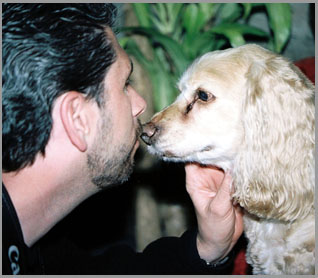Kelly Marshall
Sept. 2008
When your dog softly whimpers that means: “I’m hurt!” “I’m frightened.” The average human is most likely to hear this at the vet, when a dog is suffering, or when an obedient dog is in a strange location that appears intimidating. This is really a mewing sound that young dogs make when they feel cold, hungry, or troubled.
Loud, long-drawn-out whining sounds mean: “Please give me something . . .” or “I want something …” A puppy usually uses this sound when he’s waiting for his meal, or for the leash to be put on, or when they are trying to get his master’s attention, etc.
When a dog sighs accompanied by a dog’s lying down with his head on his forepaws, can have two meanings, depending on the context and his facial expressions. With his eyelids half-open, this is a sign of enjoyment, which means “I am happy and am going to relax.” With eyes wide open, this is a sign of dissatisfaction when something expected has not transpired, this means: “I quit!”
When a dog is baying: This is the sound of hounds during a hunt. It is translated as “Follow me this way!” “Let us attack him!” or “All together now!”
When a dog yip-howls this is really more of a yip-yip-yip-howl, with the final howl quite drawn out. It basically means “I am very lonely” “I feel deserted!” or “Where is everybody?”
When a dog howls: “I’m over here!” “This is my space!” or “I hear you out there!” A confident dog will howl just to announce where he is. Howling also often happens in response to a yip-howl from another canine. It has a more echoing sound to the human ear than does the yip-howl, which is often called mournful.
When a dog moans: “ar-owl-wowl-wowl . . .” over a short period of time. It is a sound of impulsive pleasure and excitement that means “I am flabbergasted!” or “Let’s play!” A dog usually moans when something he anticipates something exciting to happen.
When a dog is panting: “Let us go now!” This means he is very excited.
Pets can also learn vocalizations. For example, the bark that dogs often give to the command speak sounds are very different from an impulsive bark. The same can be said for the bark that police dogs are taught. Many dogs can be taught certain sounds for certain settings, from simple barks, moans, or play-growls to more complicated sounds that may sound like yodels.
Other Dog Bytes
To learn more about your hound and what it may be trying to tell you – -like what digging is all about right in the middle of the back yard, head to helpful resources on the web and locally. You can find plenty of free pet tips, for example, on pet websites – like those at Squidoo, MySpace and Hubpages under “dogs” searches in each place.
Or check with your local librarian to order a bookstack on the topic, available for pickup later on in the week for studying back at your home.

